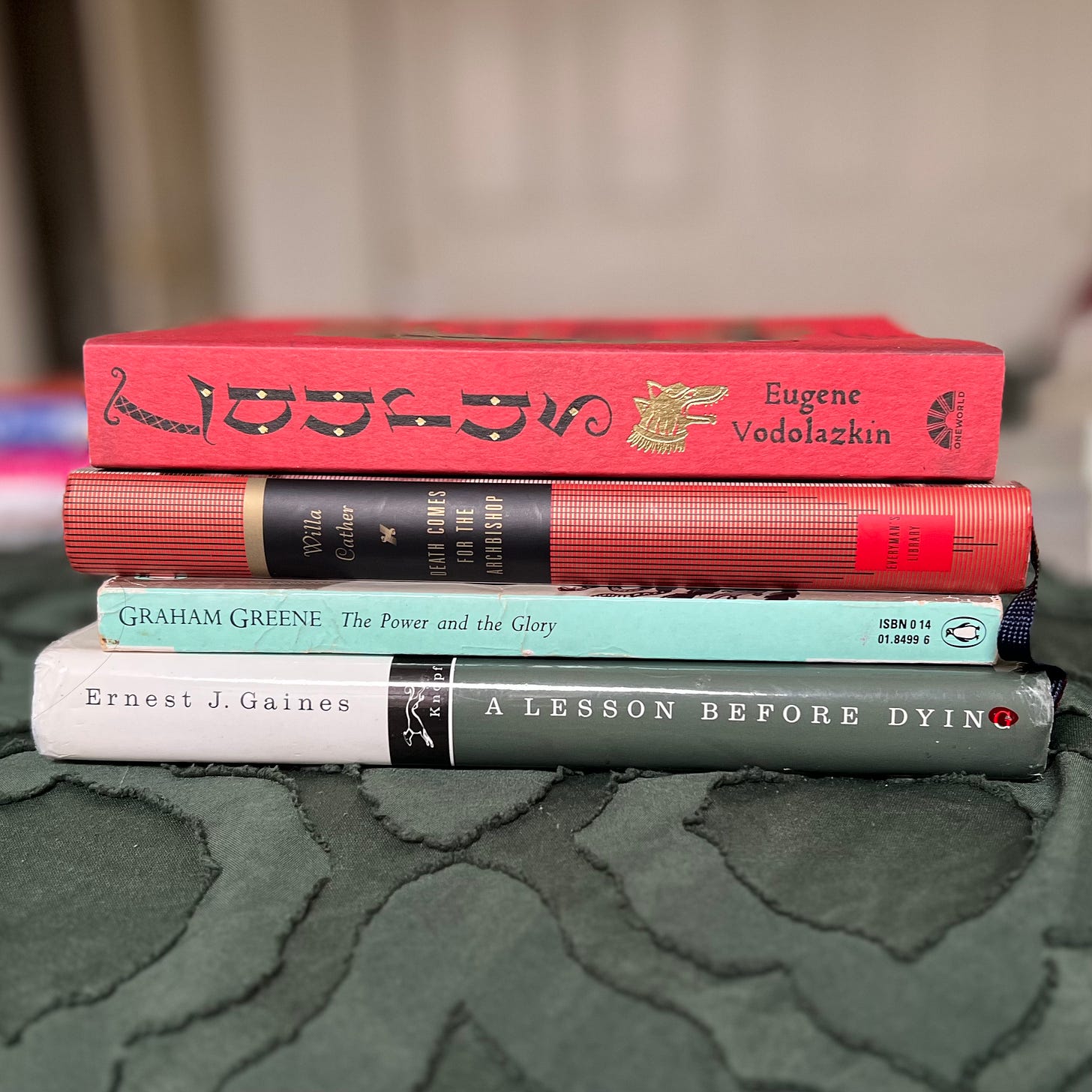I am at the stage of life where I do not think I shall have a quiet week for a very long time. Thus far I have been to a birthday party at my mother’s, a wake, a funeral, an allergist appointment for a young child’s skin test, gotten sick and missed work for several days, volunteered to help families with IEPs, had two birthdays for two children on the same day, and gotten accepted into an MFA program!
Oh, that last part… Yes, with all the encouragement from my friends (on Substack and elsewhere) I was able to go ahead and apply for the Master of Fine Arts program at the University of St. Thomas in Houston. I have a student email and ID and everything now! By the time I enter the program in the fall I will be 49-years-old, and as I write this I think about the decades of dreaming—years one could think were wasted but weren’t. My life as a mother required all the time and attention I gave it, and during that time I was able to gather knowledge about how I learn, what I love and value, how to establish boundaries, how to make friends, who needs my help and how to help others, and how to measure time in a way that doesn’t trigger a doomsday clock of anxiety in my ribcage.
My children are mostly grown but complex. It has taken years to get to this stage of relative stability (ambulance trips aside). And I finally have time to retreat into my room to write at least one beautiful, good and true poem before I kick the bucket. That’s the goal.
One of my friends asked me if I really needed an MFA program, and at this point I have to say, yes, I absolutely do at this point since I have tried without for so long and have not made much progress. I know Ann Patchett wrote in an essay (in this book) saying she didn’t believe that MFA programs were necessary for someone to be a good writer. I think that is true for a lot of people. Many people just need to write and write and write, especially if it is for fiction or nonfiction. Eventually you are just bound to get better. You will develop a style, a voice, a craft. Mind you, Ann Patchett got her masters from the famous Iowa writers’ workshop program so I think it is really hard to say in her case that MFAs are not necessary. She likely still benefited from her education even if she thinks she probably could have done without it.

The season of Lent is upon us, and one of my practices during this time is to stop reading stuff like The Expanse and The Witcher series and pick up something more appropriate. These are the four I am considering this season and I would some advice on which one I should (re)read this year:
Death Comes for the Archbishop by Willa Cather (1927)
One could argue that the most quintessentially American Catholic novels was not penned by a Catholic at all. Cather’s novel of two priests in the New Mexico missionary territory is written in such spare beauty as to evoke the southwestern desert landscape in which much of the action takes place. The story contains horribly fallen characters like Fathers Martinez and Lucero and the murderous Buck Scales but also depicts fictionalized real people including Kit Carson, Manuel Antonio Chaves and Pope Gregory XVI. At the center is the eponymous archbishop, Jean Marie Latour, whose quiet life of dedication to the church serves as an appropriate meditation for those who may choose to read this book for Lent.
The Power and the Glory by Graham Greene (1940)
Written by the Catholic convert Graham Greene, The Power and the Glory is set during the Cristero War in 1920s Mexico and follows the struggles of the “whiskey priest” as he tried to evade capture from an unnamed Lieutenant. This novel is a tale of persistent faith and redemption in the face of violent persecution which makes this a worthy read for the season.
A Lesson Before Dying by Ernest J. Gaines (1993)
Set in a small Cajun community in the 1940s this book tells the story of Jefferson, a black man set to die for a crime where his culpability is questionable, and Grant Wiggins, an educated black man who visits Jefferson before his execution. A novel is ultimately about existential revelation and sacrifice, and definitely appropriate to start in February which is Black history month.
Laurus by Eugene Vodolazkin, trans. Lisa Hayden (2015)
Ironically, the most recently written of my four books is Laurus which is set furthest in the past—medieval Russia—and follows Arseny as he transforms (and is even renamed) throughout four major sections of this novel. Told as an expansive journey, Vodolazkin creates a character gifted with healing powers who spirals closer and closer to God with every iteration of his identity. Again, the theme of sacrifice is strong and the resolution is painful but well earned.
I read The Power and the Glory last year with a Lenten book club created just to read this book for Lent. It was such a good experience that I would not mind doing this again. I have read everything except for Gaines’s novel, but I have heard wonderful things about it from others whom I trust, and I read A Gathering of Old Men which I found compelling. I am fairly certain this is a good book for this list.
I would love to hear what other books I should consider. Lent is fast approaching, and I think I am close to settling between A Lesson Before Dying and Laurus. I also was considering Ben-Hur and Les Misérables, but I didn’t think the length of the novels would be realistic given my classwork load this spring.



